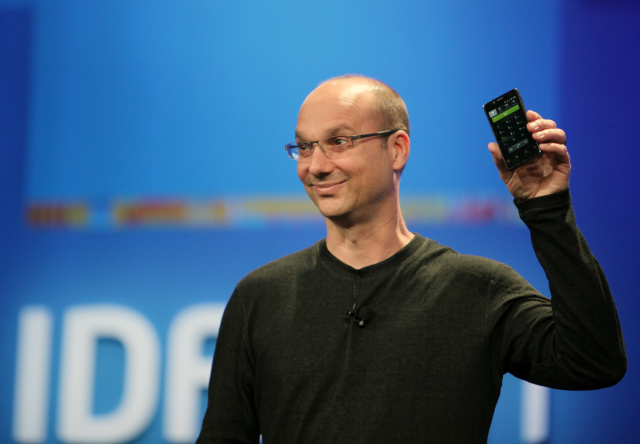
Android is on trial today in San Francisco, and its founder, Googler Andy Rubin, is stepping into the witness stand to save it from a slow death by patent litigation.
[aditude-amp id="flyingcarpet" targeting='{"env":"staging","page_type":"article","post_id":420564,"post_type":"story","post_chan":"none","tags":null,"ai":false,"category":"none","all_categories":"business,mobile,","session":"C"}']The crux of Rubin’s testimony today revolved around the greatest of all Android buzzwords: fragmentation.
Google is being sued by Oracle for copyright violation and patent infringement. Oracle-owned Java, an open-source programming language, is used in the Google-owned Android mobile operating system. An Oracle victory in the case could be enough to strangle Android, which doesn’t generate enough revenue to pay for software licensing.
AI Weekly
The must-read newsletter for AI and Big Data industry written by Khari Johnson, Kyle Wiggers, and Seth Colaner.
Included with VentureBeat Insider and VentureBeat VIP memberships.
Yesterday, Rubin dropped a bit of a bomb in court. In 2006, while Android was in early stages of development, Rubin sent a series of emails seemingly acknowledging the Java APIs as copyrighted and subject to licensing or permission from Java’s owner (then Sun Microsystems).
Related Coverage: Eric Schmidt’s surprising, contradictory testimony
When asked in court whether he thought in 2006 that he needed Sun’s permission to use the java.lang API and whether he thought the java.lang API was copyrighted, Rubin responded, “Yes.”
However, the following year, Sun CEO Jonathan Schwartz wrote a public blog post congratulating the Android team on its progress. Far from claiming Android was damaging Java’s rights-holders, Schwartz said the mobile OS had “strapped another set of rockets to the community’s momentum.”
These statements from Schwartz, whose company then owned Java, would seem to negate Oracle’s claims of infringement and damage and instead point to Sun’s approval of Google’s use of Java in Android.
Today’s statements from Rubin, however, showed another side of the Sun/Google relationship. While Schwartz was publicly enthusiastic about Android, private emails showed concerns on both sides about fragmentation.
[aditude-amp id="medium1" targeting='{"env":"staging","page_type":"article","post_id":420564,"post_type":"story","post_chan":"none","tags":null,"ai":false,"category":"none","all_categories":"business,mobile,","session":"C"}']
In April 2006, a Googler on the Android project wrote to Rubin, “We need to provide an alternative to MSFT, and we need to do it in such a way as we don’t fragment 3rd party developers… Java has very little fragmentation.”
Rubin and the Oracle attorney went back and forth over whose definition of “fragmentation” meant what, then the Oracle lawyer brought up another email. In late 2007, a Sun SVP emailed Rubin to express the company’s concerns about Google’s Java work in Android leading to “a fractured environment” for developers.
Again, Rubin dickered over whether he and Sun and all Googlers had the same definition of “fractured,” but it was clear that Rubin was tap-dancing a bit and that there was, in fact, at least some friction over whether Sun was totally in love with Google’s implementation of Java in Android.
However, outside the courtroom, we heard from Peter Yared, currently CTO for CBS Interactive and formerly Sun’s CTO of the Application Server Division. On Twitter, Yared told VentureBeat, “As one of the few peeps at Sun advocating open sourcing java back in the day, we definitely knew people would fork the code.” And yes, he clarified, forking would mean fragmentation, which Sun understood.
[aditude-amp id="medium2" targeting='{"env":"staging","page_type":"article","post_id":420564,"post_type":"story","post_chan":"none","tags":null,"ai":false,"category":"none","all_categories":"business,mobile,","session":"C"}']
“We felt that the Java technology compatibility kits would prevent frag[mentation] & maintain revenue. Ironically, now companies like Amazon are forking Android, and devs are complaining about Android fragmentation.”
Google’s attorneys will question Rubin themselves later during their portion of the trial. Next up, former Google CEO Eric Schmidt is taking the stand, so stay tuned for details on his testimony.
VentureBeat is reporting live from the courthouse today; all quotations are direct from the named sources.
Follow all VentureBeat’s courtroom reporting in Oracle V. Google
[aditude-amp id="medium3" targeting='{"env":"staging","page_type":"article","post_id":420564,"post_type":"story","post_chan":"none","tags":null,"ai":false,"category":"none","all_categories":"business,mobile,","session":"C"}']
VentureBeat's mission is to be a digital town square for technical decision-makers to gain knowledge about transformative enterprise technology and transact. Learn More